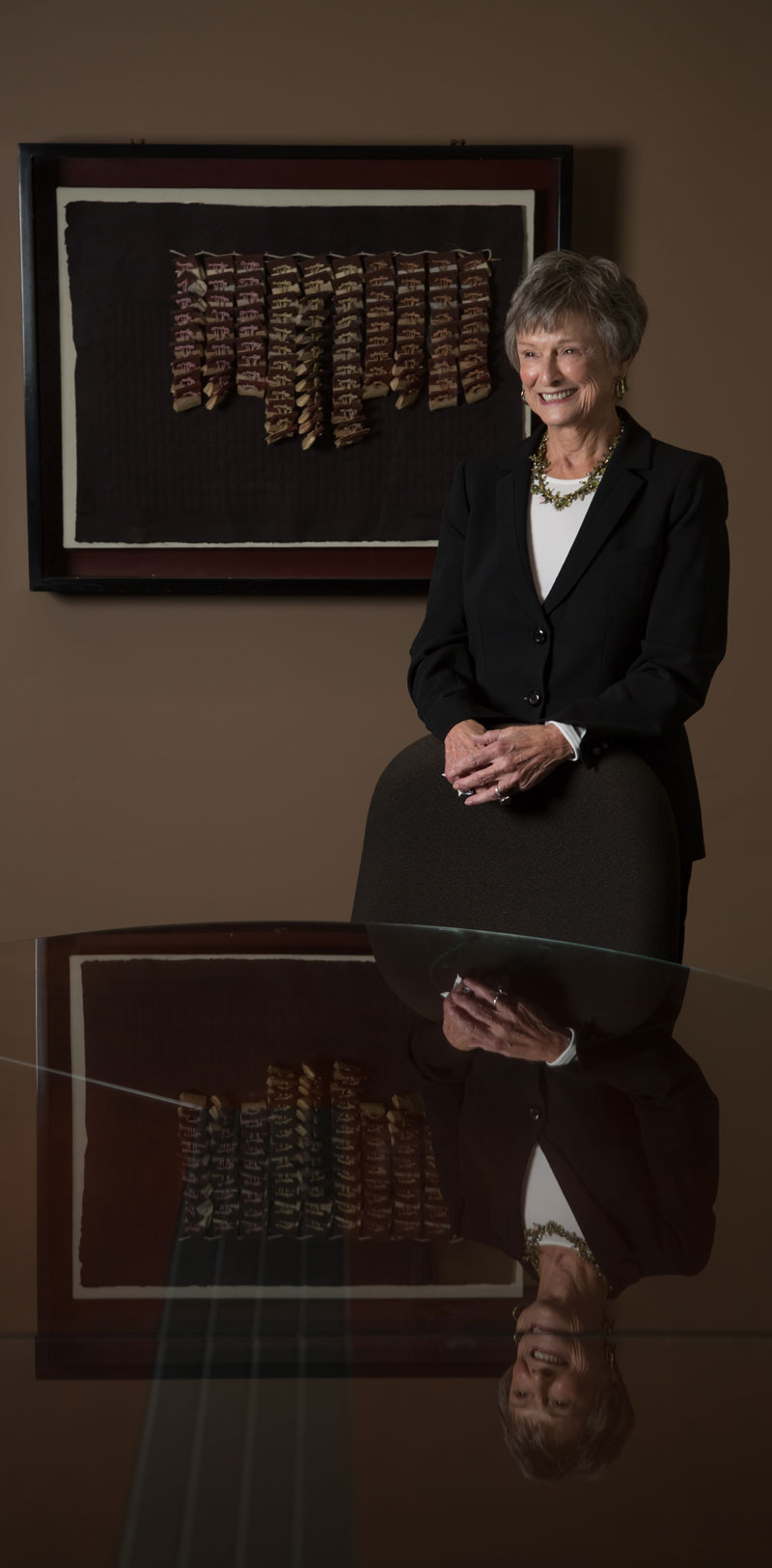Loss and Triumph
From Aqua-Maid to Entrepreneur, Astronaut’s Widow Proves Herself a Shrewd Business Executive and Generous College Benefactor
By Wendell Brock

As CEO of TechTrans International, Bauer College supporter Beth Williams empowers her team — “I think what you should do is train your employees and give them the job. And if they have a problem they come to you. And that is the way it kind of works in our office. We have a whole lot of people with opinions, and I love it.”
Many years ago, Beth Williams left her North Carolina home for a life of adventure. And boy, did she find it.
She was a water-skiing Aqua-Maid at Florida’s Cypress Gardens. She appeared in a TV film with aquatics legend Esther Williams. And in 1964, she married America’s first “bachelor astronaut,” Clifton Curtis Williams Jr. When the celebrity couple arrived, Houston was building the Astrodome, Lyndon B. Johnson was president, and America was awestruck by NASA’s astronauts.
“He was a second lieutenant when I met him,” Williams recalls of her husband, who everybody called C.C. “We had dated and dated and dated and, finally, we decided: ‘OK, we’ll marry.’”
Though her husband had been scheduled for a voyage to the moon, he never realized that mission. He died in a jet crash in 1967, leaving Williams pregnant with their second child.
But she was not to be defeated.
Again and again, Beth Williams has proven herself a figure of resiliency, courage, determination and hard work. She’s a remarkably successful entrepreneur — and a generous benefactor to Bauer College.
Today, Williams — a plucky, petite, plainspoken redhead — is the CEO of TechTrans International, a company she founded in 1993 to provide administrative support, and language and logistics services, to NASA. Williams, who worked in real estate while her two daughters were young, was persuaded to create TechTrans by co-founder Natalie Karakulko, an interpreter for the Apollo-Soyuz Test Program who was eager to start her own company.
From its humble beginnings, TechTrans has grown from five employees to more than 200. In addition to translation, interpretation and language-training services, the firm provides logistical support to businesses and government agencies the world over. It has offices in Russia, Jordan, Azerbaijan, Georgia, Kazakhstan, Uzbekistan and Colombia.
Williams — who was featured in Lily Koppel’s 2013 nonfiction book, “The Astronaut Wives Club” — runs a tight, efficient organization with a hands-off management policy and minimal meetings. “I believe in lack of management,” she says, only half-joking. “I think more managers confuse the issue.”
"It is a fantastic program, and I just truly believe in it."
Since the early 2000s, Williams has contributed to Bauer’s Wolff Center for Entrepreneurship (WCE) — first as a speaker, later as a one-on-one mentor, most recently as a donor.
“It is a fantastic program, and I just truly believe in it,” she says. In 2010, she established the TechTrans International Scholarship Endowment. She and her employees continue to give to the fund, which has more than doubled in value, and in October 2015, she renamed it the Dave Cook Scholarship Endowment, in honor of the WCE’s longtime director of mentoring.
From the minute she was invited to speak at a college brown-bag luncheon some years ago, she was wildly impressed by the entrepreneurship students. “Those kids were just amazing, and I thought: ‘God, if I knew then what they are being taught now.'”
One student asked Williams if she would be her mentor — and later showed up at her office with a group of classmates. Williams was generous with her time and opened doors to her staff of technology experts and business managers. And at the personal level, the executive had much to share — on matters of bootstraps entrepreneurship and overcoming obstacles.
Just a few months after starting TechTrans, Karakulko, Williams’s friend and business partner, was killed by a drunk driver. “It was devastating,” Williams recalls. “The three people that were working there were all very close to her and had been with her for years. And then there was me. I was their unknown. But they stuck with me. They are still with me.”
At the same time, Williams had to win the confidence of NASA, an organization that was close to her heart for obvious reasons. But NASA didn’t cut her any slack. “I really had to prove myself up and down, because they knew I didn’t have that technical background,” she says. “I think they were very nervous about it in the beginning, but as time has gone by, they really do realize we know what we are doing.”
Koppel calls Williams a “trailblazer,” “a good listener,” and an advocate for others.
“Beth is an exceptional businesswoman and friend,” the author says.
These days, Williams’ quest for adventure seems to have subsided — just a bit. She doesn’t load her shotguns to go duck hunting like she once did, but she still loves saltwater fishing. She recently built a new home on Galveston Bay and enjoys photographing the world around her — the birds, the sky. “I get up in the morning, and I take a picture of the sunrise because it’s so gorgeous.”
After 50 years in Houston, Williams can’t get over the spirit and vitality of her adopted hometown. She believes Houston — with its space program and energy industry, its entrepreneurs, start-ups and innovators — is just the best place on earth to do business.
“I have never known people like this,” she says. “You just can’t get ’em down. There’s just something about Houston and the people you meet. No BS — that’s always my favorite thing.”
This story originally appeared in Volume 3, Number 1 of Inside Bauer magazine.